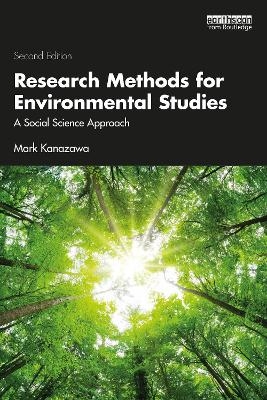
Research Methods for Environmental Studies
Routledge (Verlag)
978-1-032-19840-8 (ISBN)
.
The methodological needs of environmental studies are unique in the breadth of research questions that can be posed, calling for a textbook that covers a broad swath of approaches to conducting research with potentially many different kinds of evidence.
Fully updated to address new developments such as the effects of the internet, recent trends in the use of computers, remote sensing, and large data sets, this new edition of Research Methods for Environmental Studies is written specifically for social science-based research into the environment. This revised edition contains new chapters on coding, focus groups, and an extended treatment of hypothesis testing. The textbook covers the best-practice research methods most used to study the environment and its connections to societal and economic activities and objectives. Over five key parts, Kanazawa introduces quantitative and qualitative approaches, mixed methods, and the special requirements of interdisciplinary research, emphasizing that methodological practice should be tailored to the specific needs of the project. Within these parts, detailed coverage is provided on key topics including the identification of a research project, hypothesis testing, spatial analysis, the case study method, ethnographic approaches, discourse analysis, mixed methods, survey and interview techniques, focus groups, and ethical issues in environmental research.
Drawing on a variety of extended and updated examples to encourage problem-based learning and fully addressing the challenges associated with interdisciplinary investigation, this book will be an essential resource for students embarking on courses exploring research methods in environmental studies.
Mark Kanazawa is the Wadsworth A. Williams Professor of Economics at Carleton College, where he has served as both Chair of the Economics Department and Director of Environmental Studies. He regularly teaches courses in environmental economics, econometrics, and research methods for environmental studies. He has also authored two other books: Natural Resources and the Environment (2021) and Golden Rules (2015).
PART I Introduction to research and research methods 1 Introduction to research methods in environmental studies; 2 A brief history of knowledge and argumentation; 3 General research design principles; 4 Ethical issues in environmental research; PART II Quantitative research 5 General principles of quantitative research; 6 Quantitative data and sampling; 7 Basic quantitative methods and analysis; 8 More on hypothesis testing; 9 More advanced methods of quantitative analysis; 10 Spatial analysis and GIS; PART III Qualitative research 11 General principles of qualitative research; 12 Coding for qualitative analysis; 13 The case study method; 14 The ethnographic approach; 15 Actor-network theory; 16 Environmental discourse analysis; 17 Participatory action research; 18 Mixed methods; PART IV Data collection 19 Data collection I: Principles of surveying; 20 Data collection II: Interviewing; 21 Data collection III: Focus groups; PART V Proposal writing 22 Writing a research proposal
| Erscheinungsdatum | 21.07.2023 |
|---|---|
| Zusatzinfo | 6 Tables, black and white; 77 Line drawings, black and white; 12 Halftones, black and white; 89 Illustrations, black and white |
| Verlagsort | London |
| Sprache | englisch |
| Maße | 156 x 234 mm |
| Gewicht | 760 g |
| Themenwelt | Mathematik / Informatik ► Informatik ► Theorie / Studium |
| Mathematik / Informatik ► Informatik ► Web / Internet | |
| Naturwissenschaften ► Biologie ► Ökologie / Naturschutz | |
| Sozialwissenschaften ► Soziologie ► Empirische Sozialforschung | |
| ISBN-10 | 1-032-19840-0 / 1032198400 |
| ISBN-13 | 978-1-032-19840-8 / 9781032198408 |
| Zustand | Neuware |
| Informationen gemäß Produktsicherheitsverordnung (GPSR) | |
| Haben Sie eine Frage zum Produkt? |
aus dem Bereich


